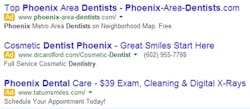3 tips for dentists who want to maximize paid search advertising results
More patients today are turning to search engines such as Googlebefore setting foot in a dental practice. According to Pew, 44% of Internet users look online for information about doctors or other health professionals before making medical decisions. Seventy-seven percent of people seeking online health-care information start their research on a search engine, and, according to WordStream, the top three links on a search engine results page receive 41.1% of the clicks. This means that a lack of visibility on major search engines can severely impact a practice’s ability to add new clients.
Paid search advertising is one way dental practices can target potential patients and ensure a level of search engine visibility. Paid search advertising allows medical professionals to create highly targeted ads using specific keywords, audience specific content, and ad extensions to help foster conversions and a high ROI.
Start with comprehensive keyword research
Every paid search strategy should begin with a foundation of solid keyword research. For dental practices, this means finding out which keyword derivatives searchers use most often, and creating a list of which keywords to target. One tip for medical professionals is to break down their services into small niche groups. For example, an office may focus on dental care, but paid search keywords such as "pediatric dentist," "cosmetic dentist," “dental hygienist,” or “oral surgeon” may also apply.
To find keyword volumes, dental professionals can use available and free applications like Google Adwords Keyword Tool and Bing Ad Intelligence. Both have the ability to project keyword search volumes, find related keywords, and break down the analytics of each keyword, including click-through-rate and cost-per-click.
Creating targeted and effective ad copy
Once the list of keywords is chosen, dental offices should create content that speaks to searchers of each keyword. By creating unique ad copy that is optimized to each keyword, businesses can increase their click-through-rate and potential conversions. The key is to create copy that clearly explains the services being offered while also giving searchers a distinct reason to click on the ad.
Two ways to increase the click-through-rate are using a hook or a call to action. A hook for a dental office might be a discount, weekend availability, new technology or techniques, a statement about experience, or financing options. Calls to action are statements like “call now,” “come in today” or “find out more.”
Target based on location
Geographic targeting can greatly increase the click-through-rate of paid search ads while reducing the overall cost of the advertising campaign. The most effective strategy for dentists is to target ads based on location. Location targeting helps focus advertising on the areas with the right customers, and hopefully helps increase profits as a result.
Because most patients are only willing to travel a limited distance to see a dentist for a regular checkup, dentists should target searchers in their immediate vicinity. Within the search engine advertising platforms, businesses can choose distance options as wide as cities or as simple as the radius around a location.
Use ad extensions to target mobile searchers
The two major search ad platforms, Google and Bing/Yahoo!, offer extensions that can increase the click-through-rate and conversions by giving searchers more direct access to information. Three options that may help dental offices are the phone number, address, and ratings and reviews extensions.
For desktop searchers, the call and address extensions put a phone number or address directly under the banner copy. For mobile users, searchers are given the option to click a button to have it call the dentist’s office or bring up directions automatically. For searchers, this means less searching of websites for an important piece of information, and for businesses it helps create conversions without the need for any clicking.
The ratings and reviews extension can influence a user to choose you over another office. Consumers say reviews impact their decisions when searching online. Search Engine Watch reports that 85% of consumers read reviews for local businesses before they spend any money. Ninety percent of consumers say that positive online reviews have a direct impact on their buying decisions, while 86% of people were affected by negative reviews, according to Dimensional Research.
Conclusion
Dental offices should be aware of the power of search engine advertising when they create a digital marketing strategy. With more potential patients turning to search engines before making appointments, creating a strong presence on search engines using paid advertising can help dentists stand out in a crowded.



